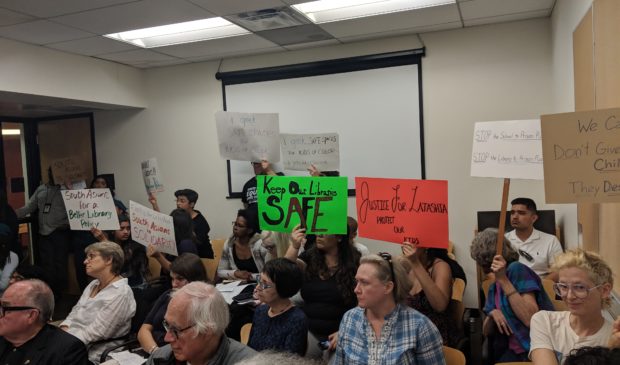Tense meeting over arrest at library
Tuesday, March 26, 2019 by
Jack Craver The Library Commission heard impassioned testimony Monday night over the arrest last month of a 13-year-old girl at the Austin Public Library’s Carver branch.
Activists showed up to the meeting at the Terrazas branch on Cesar Chavez Street to urge the library system to adopt new policies aimed at avoiding police calls while Library Director Roosevelt Weeks said library staff had nothing to do with the arrest and defended librarians from what he characterized as hurtful allegations from activists.
The girl’s cause has been championed by Black Sovereign Nation, a local group that engages in a variety of advocacy and training efforts geared toward empowering the African-American community. In at least one recent Facebook post, the group advocated for the city “completely divesting from the system of policing altogether.”
At the commission hearing, Njera Keith, executive coordinator of Black Sovereign Nation, listed a number of recommended policy changes for the library. These included training staff on racial equity and de-escalation techniques and putting in place a policy against calling the police in response to any violation committed by a minor.
The group also advocated the establishment of “youth-appointed youth advocates” to represent the interests of young people to library staff. Similarly, the group recommended Austin follow the example of some other cities and establish an at-large position on the Library Commission for a youth appointee.
Keith and the group’s deputy coordinator, Kristina Brown, said they had tried and failed to meet with Weeks on the matter. Other activists who had shown up in support also decried what they described as the criminalization of youth in what is supposed to be a welcoming public space.
After the citizen testimony concluded, Weeks flatly denied responsibility for the arrest, saying that no library staff called the police and that the police arrived because of a 911 call from a parent. Moreover, he said, the girl was not inside the library or taking part in library programming. In short: The incident had nothing to do with the library.
Weeks read reports of the incident provided by both library staff and the police department.
APD contends that officers arrived on scene in response to a call from a 12-year-old girl who was in the library and scared to leave because she said a group of kids were waiting to beat her up. The police report states that an officer determined one of the girls present had an outstanding arrest warrant, which is why she was arrested.
The library report said that a library security guard was waiting for the frightened child’s parent to arrive and that library staff later observed an APD officer arrive and begin patting down a girl outside.
Weeks said he was personally hurt by allegations that his staff was ill-equipped to deal with youth or unsympathetic to the needs of minority children.
“You guys said some very hurtful things about our staff and the training they’ve received and that we don’t care about our black and brown kids,” said Weeks, who is African-American. “Libraries and kids go together. Our main customer is our kids.”
“I’m an African-American and I understand what the challenges are,” he said. “I have six kids. I have eight grandkids.”
“Our staff is under extreme pressure. And they handle it well,” he later added, saying that last year there were “20 incidents” at libraries and staff didn’t call the police once.
Weeks’ comments prompted several interruptions from the activists, who accused him of not telling the truth and contradicting what his own staff had said about the incident.
The commission ended the discussion without taking any action.
Outside afterward, Keith and Brown thanked the group of roughly 20 who had shown up to attend the meeting in support. Brown said the group would likely have to take the fight to City Council.
“We will continue testifying until they get the point that we will not stand for our youth to be vulnerable in this way,” said Brown, “especially in a space that we pay for.”
The Austin Monitor’s work is made possible by donations from the community. Though our reporting covers donors from time to time, we are careful to keep business and editorial efforts separate while maintaining transparency. A complete list of donors is available here, and our code of ethics is explained here.
You're a community leader
And we’re honored you look to us for serious, in-depth news. You know a strong community needs local and dedicated watchdog reporting. We’re here for you and that won’t change. Now will you take the powerful next step and support our nonprofit news organization?



